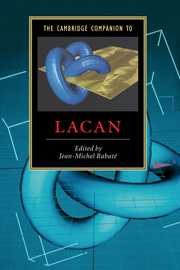Book contents
- Frontmatter
- 1 Lacan’s turn to Freud
- 2 The mirror stage: an obliterated archive
- 3 Lacan’s myths
- 4 Lacan’s science of the subject: between linguistics and topology
- 5 From the letter to the matheme: Lacan’s scientific methods
- 6 The paradoxes of the symptom in psychoanalysis
- 7 Desire and jouissance in the teachings of Lacan
- 8 Lacan and philosophy
- 9 Lacan’s Marxism, Marxism’s Lacan (from Žižek to Althusser)
- 10 Ethics and tragedy in Lacan
- 11 A Lacanian approach to the logic of perversion
- 12 What is a Lacanian clinic?
- 13 Beyond the phallus: Lacan and feminism
- 14 Lacan and queer theory
- 15 Lacan’s afterlife: Jacques Lacan meets Andy Warhol
- Further reading
- Index
- Series List
6 - The paradoxes of the symptom in psychoanalysis
Published online by Cambridge University Press: 28 May 2006
- Frontmatter
- 1 Lacan’s turn to Freud
- 2 The mirror stage: an obliterated archive
- 3 Lacan’s myths
- 4 Lacan’s science of the subject: between linguistics and topology
- 5 From the letter to the matheme: Lacan’s scientific methods
- 6 The paradoxes of the symptom in psychoanalysis
- 7 Desire and jouissance in the teachings of Lacan
- 8 Lacan and philosophy
- 9 Lacan’s Marxism, Marxism’s Lacan (from Žižek to Althusser)
- 10 Ethics and tragedy in Lacan
- 11 A Lacanian approach to the logic of perversion
- 12 What is a Lacanian clinic?
- 13 Beyond the phallus: Lacan and feminism
- 14 Lacan and queer theory
- 15 Lacan’s afterlife: Jacques Lacan meets Andy Warhol
- Further reading
- Index
- Series List
Summary
Lacan without paradox
Paradoxical formulas are not lacking in Lacan's texts and teachings. As far as the symptom is concerned, these paradoxes culminate in the idea that normative heterosexuality is itself a symptom, and that sexual partners are symptoms for each other. Is Lacan being facetious and indulging his notorious taste for paradox? Is he performing intellectual acrobatics? The questions can rebound endlessly, but I, for one, conclude from all my readings and my clinical experience that the Lacan we meet here is not paradoxical any more. In fact, with the symptom, each psychoanalyst should be prepared to be questioned, for what he or she has to say about symptoms provides a test for the consistency of his or her praxis and doctrine. No doubt Lacan has to be tested like all others on this point, and if he is, the verdict reached after we follow his successive elaborations will correspond to the rigor of a rationalism that is never canceled but always adjusted to the specificity of its field.
We just need to read Lacan closely. In some twenty years of teaching, his definitions of the symptom evolved. One can verify that, at each state, they were compatible with the overall theory, and in particular, with the successive definitions he gave of the unconscious. Thus, when he defined the unconscious as speech, which had been suggested by the technique of the talking cure, he treated the symptom as a kind of message, an encoded cipher for a gagged discourse containing a kernel of truth.
- Type
- Chapter
- Information
- The Cambridge Companion to Lacan , pp. 86 - 101Publisher: Cambridge University PressPrint publication year: 2003
- 7
- Cited by



